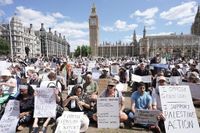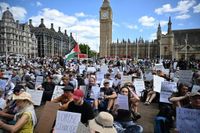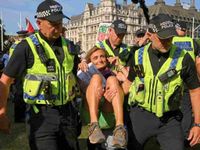The debate over the United Kingdom’s decision to ban Palestine Action, a direct action group known for its high-profile protests against companies linked to Israel’s military, has erupted into one of the most contentious civil liberties battles in recent British history. On August 9, 2025, the controversy reached a boiling point when Metropolitan Police arrested 532 protesters in Parliament Square, London—many of them elderly—during a demonstration against the ban. The scale of the arrests, the legal stakes, and the political fallout have all combined to make this a moment of reckoning for the rights of protest and the boundaries of anti-terrorism law in the UK.
According to BBC News, the sit-in protest saw demonstrators holding placards reading, “I oppose genocide, I support Palestine Action.” Of those arrested, the police reported an average age of 54, with 112 protesters aged over 70. The vast majority—522—were detained for displaying items in support of Palestine Action, now a proscribed organisation under the Terrorism Act as of July 2025. The arrests marked the largest such event since the infamous poll tax riots of 1990, as noted by The Independent.
The Labour government’s decision to proscribe Palestine Action followed a series of incidents, including a headline-grabbing act earlier in 2025 in which four members of the group were accused of causing around £7 million worth of damage to RAF aircraft at Brize Norton. While the government argues that the group’s activities meet the legal definition of terrorism—citing not only criminal damage but also reports of injuries and alleged targeting of Jewish-owned businesses—critics argue the move is a disproportionate response that sets a dangerous precedent for freedom of expression and protest.
Home Secretary Yvette Cooper defended the ban and the subsequent arrests, stating, “Proscription is about one narrow group that has been involved in violent attacks including injuries, including weapons, smoke bombs causing panic among innocent people, major criminal damage.” She added, “Many people may not yet know the reality of this organisation, but the assessments are very clear—this is not a non-violent organisation. UK national security and public safety must always be our top priority.” According to BBC News, Cooper’s decision was informed by the Joint Terrorism Assessment Centre and ongoing legal proceedings, with some details withheld from the public due to national security concerns.
Yet, the backlash has been fierce and cross-party. Labour peer Shami Chakrabarti warned that the proscription risked becoming a “mistake of poll tax proportions,” referencing the policy that once triggered mass civil disobedience and riots under Margaret Thatcher. She told The Independent, “The notable presence of so many older people highlights the strength of genuine feeling. Criminal damage at air force bases can be prosecuted, but sweeping guilt by association only exacerbates community tensions and creates a bigger headache for the police.” Former Conservative cabinet minister Sir David Davis echoed these concerns, calling the arrests an “excessive use of counterterrorism law” and questioning the evidence for proscribing Palestine Action: “They broke in and painted an aircraft, they did not set bombs or anything. So that’s the first question. What was the criteria? And then secondly, should you be arresting lots of people because they support a particular side and put up a banner?”
Civil liberties groups have also weighed in, with Amnesty International’s Sacha Deshmukh declaring, “Peaceful protest is a fundamental right. People are understandably outraged by the ongoing genocide being committed in Gaza and are entitled under international human rights law to express their horror.” Liberty’s Sam Grant remarked, “The scenes we saw over the weekend of mass arrests at public protests are deeply concerning. That hundreds of people were arrested under these powers further highlights the dangerous breadth and vagueness of the UK’s anti-terrorism laws.” Both groups argue that conflating protest activity with terrorism has a chilling effect on democratic freedoms.
For many protesters, the legal risks appear to have become a badge of honor. According to a spokesperson for Defend Our Juries (DOJ), the group organizing the protests, “Despite or because of the legal risks, the government has turned an arrest for terrorism into a badge of honour for resistance to genocide. We have been inundated with offers of support from all quarters.” The DOJ expects the next demonstration, planned for September 6, 2025, to draw even larger crowds—potentially over 1,000 people—raising the stakes for both the government and campaigners. The spokesperson added, “If 5,000 people show up, we’re certain the ban will be gone, and with it, most likely, Yvette Cooper.”
The legal battle over the ban is far from over. Palestine Action co-founder Huda Amori has been granted a judicial review of the proscription in the High Court, scheduled for autumn 2025. If the court finds the ban irrational or disproportionate, it could be overturned, freeing the hundreds arrested so far and potentially reshaping the government’s approach to protest and counterterrorism. Amori has argued that the government’s own papers show that Palestine Action did not advocate violence, contesting the official narrative. “The system can't cope when thousands resist,” she said on social media, as reported by BBC News.
Meanwhile, the practicalities of prosecuting such a large number of people are daunting. Former top prosecutor Nazir Afzal told The Independent that bringing cases against all those arrested would be “a terrific waste of time,” predicting that jury trials would not begin until 2027 at the earliest and doubting that convictions would be secured. Indeed, only three people have so far been charged with the lesser offence of displaying support for Palestine Action during a previous demonstration, with their court appearances set for September 2025. Many believe the majority of cases may never reach trial, especially given the public sympathy for the mostly older protesters and the awkward position in which police now find themselves.
The government, however, remains steadfast. Victims Minister Alex Davies-Jones said, “Palestine Action violently carried out criminal damage to RAF aircraft [and] we have credible reports of them targeting Jewish-owned businesses here in the United Kingdom, and there are other reasons, which we can't disclose because of national security. But they are a proscribed terrorist organisation and anyone showing support for that terrorist organisation will feel the full force of the law.”
As autumn approaches, all eyes will be on the courts—and on the streets of London, where another mass demonstration is set to test the government’s resolve, the capacity of the criminal justice system, and the limits of protest in modern Britain. The outcome could have a lasting impact on civil liberties, policing, and the meaning of dissent in a democracy under strain.
No matter the result, the events of August 2025 have already carved a place in the country’s history, forcing the nation to confront uncomfortable questions about the balance between security and freedom, and the true cost of dissent.



